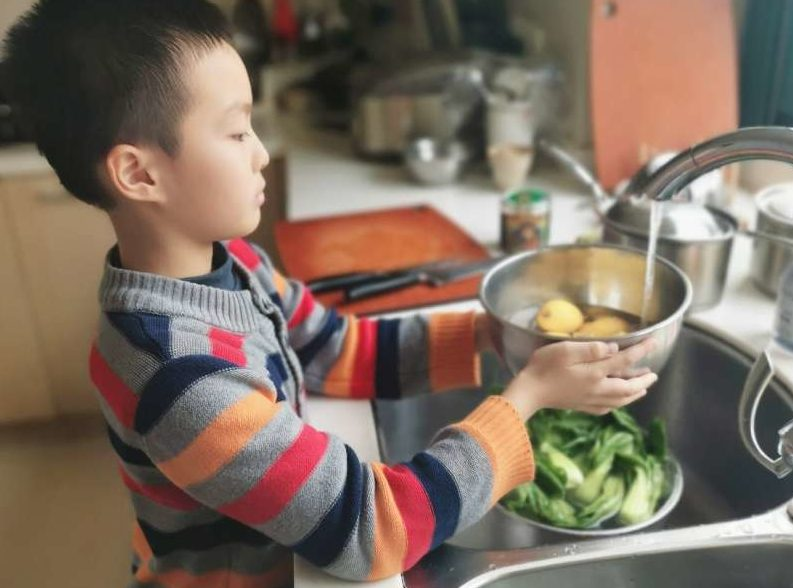Education lacking the labour-related knowledge is incomplete. ——Vasyl Sukhomlynsky, Renowned Ukrainian Humanistic Educator
During this unusual period, we have witnessed children showing their independence and responsibility through experiences of doing household chores.

Manual work is perhaps the most fundamental practical activity. Children need to gain hands-on skills and experiences to understand the meaning of doing manual work and, appropriately, household chores are therefore an important part of their education.
Since the outbreak of COVID-19, Hiba pupils have proactively participated in fundraising, exercising and online learning, fully demonstrating their responsibility awareness, selflessness and self-discipline.
In the meantime, we realised that
learning is not restricted to only studying the major disciplines, but covers all-round knowledge including reading, doing manual work and working on more general means of personal attainment.
On 20
th March 2020, the State Council and Central Committee of Communist Party of China released Opinions on the Strengthening Labour Education in Primary, Secondary and Colleges in the New Era. According to this regulation, all schools across the country should conduct practical activities of labour education and families play a vital role in promoting labour education at home.

As pupils continue to study at home during these exceptional circumstances, Hiba Primary School held an activity centred around the theme of labour education, which was: ‘
taking responsibility to do manual work’, aiming to encourage pupils to do what they can at home.
The significance of education is to ignite pupils’ passion for life, enabling them to create and maintain a happy life.
Adults should give their children the freedom to do what they should do. Doing housework by themselves will help them get to know why we should all learn to do manual work. Subsequently, they will develop an awareness of the importance of manual work, encouraging them to treat others and their work with respect.
Pupils at Primary School are often motivated to observe how their family members do household chores at home. Their observation results are invisible achievements for them and give them a new perspective on the nature of manual tasks.
Pupils have shared their thoughts in our moral education classes, expressing their respect and gratitude to their family members in terms of their heavy workload and long working hours. Training pupils to
respect manual work is a positive way to cultivate their sense of responsibility, social justice and gratitude.

Doing housework is an important aspect of practising the principles of labour education. It is also a direct way for children to get involved in manual work and take due responsibility for the maintenance of their homes, something that will help
prepare them for homeownership one day as they learn how to take care of themselves and their immediate surroundings. This echoes our Hiba Identity of being inspired and independent.
We summarised some guidelines for parents to help children better engage in housework:
- Advocate a spirit of admiring manual work at home. Parents should be role models in this regard, to help develop their children’s love of work from a young age.
- Teach children some basic household chores. For example, instructing pupils in the lower grades to tidy up their desks and make the bed, while those in the higher grades pupils can help you to cook family meals. Providing clear guidance and instructions will promote their confidence and willingness to carry out the chores.
- Create a favourable home environment in which your children can do housework. Children are advised to tackle challenges independently while gradually learning new skills by completing more advanced tasks. Do not be afraid that they may make a mess in the initial stage of doing housework. The process of learning the elements of the task being asked of them is more important than the actual result when they are only beginners.
- Assign a reasonable amount of housework to your children. By completing even a few basic tasks, they will quickly start to enjoy the work and the memorable parent-child times.
- Give rewards to your children for when they successfully complete their assigned housework. Pupils in the higher grades are encouraged to provide more intellectual services for their family with the help of parents’ support, such as offering suggestions on the household’s levels of income and expenditure. This not only develops their habit of doing housework but enables them to make a wider contribution to their family.
Alongside the previously mentioned benefits, manual work can train children’s imaginary and abstract thinking.
The self-esteem, confidence and self-respect encouraged by this kind of work provides great momentum to drive pupils to develop their emotional maturity as well as their attitude to learning.
In short, these experiences and the subsequent growth gained from housework helps pupils to develop a good habits and even build a stronger sense of character.
Being responsible for housework is a useful aid to them becoming more independent while giving them the satisfaction of helping their family. It can also be seen as an expression of love for, and appreciation of, their family We are proud to say that housework has become a part of our pupils’ independent learning at home.



